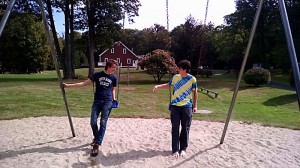 People regularly ask me how Sudbury Valley is preparing my kids for adulthood, and what they’re learning there. Early on, I would try to explain some of the things I thought my sons were learning. I now respond by saying that none of us really knows what anyone else is learning, and the process of what happens to children when they are children is not so much the point. The point is that we all want our kids to grow into productive, capable adults.
People regularly ask me how Sudbury Valley is preparing my kids for adulthood, and what they’re learning there. Early on, I would try to explain some of the things I thought my sons were learning. I now respond by saying that none of us really knows what anyone else is learning, and the process of what happens to children when they are children is not so much the point. The point is that we all want our kids to grow into productive, capable adults.
The data from 45 years of Sudbury Valley School shows that the vast majority of graduates of the school are indeed productive, capable adults. How exactly they got there is not necessarily known. I suspect that it’s the Sudbury Valley “Common Core” that does it.
There's no way to scientifically prove what makes kids grow into good adults, but there are some generally well-respected studies that show what skills kids need to become successful adults. These include the ability to delay gratification, the ability to organize your time and your stuff (executive function), and the ability to get along with others (emotional intelligence). All of these skills relate highly to adult success.
Luckily it turns out that SVS “requires” most of these skills. First, kids must organize their own time all day, every day. Same with their stuff, anything they might need to bring from home to undertake a project, game, or activity. My kids are always foraging around the house for blankets, shovels, Nerf guns, sticks, electronics and other items. And once they find them, they’ve got to make sure they don’t forget to bring them to school, because if they do, they’ll miss out on the fun.
Next, there's emotional intelligence. At SVS, kids are interacting with each other hour after hour, day after day with little adult interference. Being kids, they argue, disagree, and sometimes come to blows. But unless they want to spend their whole day writing complaints for the Judicial Committee, they have to figure out how to work out their problems fairly and satisfactorily, so that they can get on with doing what they want. If situations do get too hairy for them to handle on their own, they have a well established, peer-led procedure that helps teach them how to work out difficult interpersonal problems.
This SVS “Common Core” seems to set students up with the skills they need to take on any adult pursuits. Perhaps that’s why, despite the fears of those who think students should follow an externally prescribed learning path, SVS students develop the skills required for a successful adulthood.

